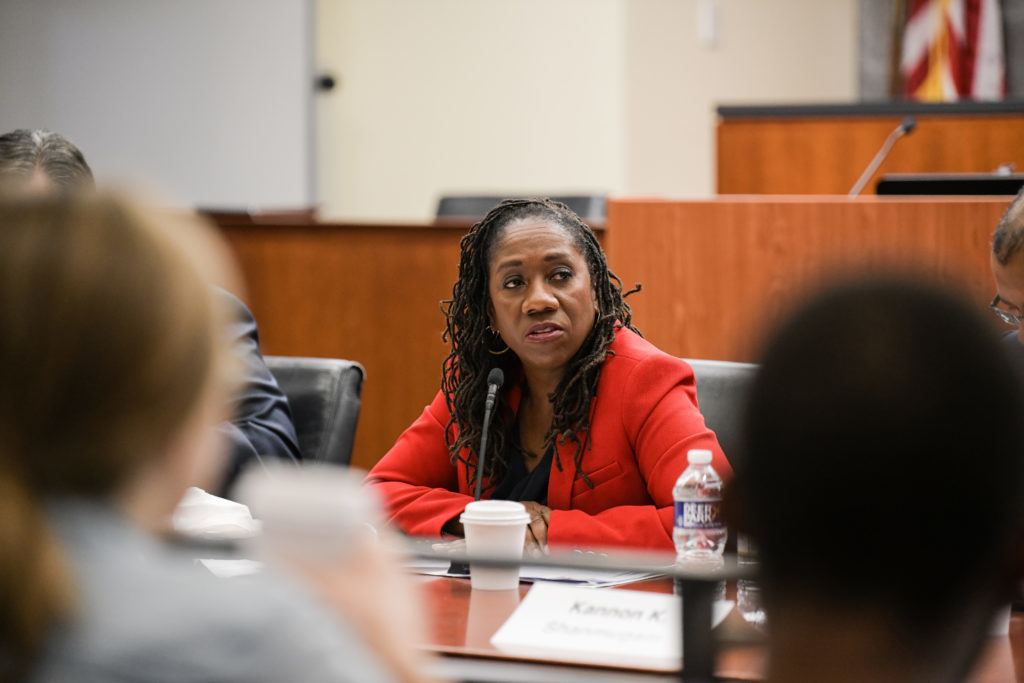A panel of legal experts discussed the major cases before the Supreme Court this October and Chief Justice John Roberts’ changing role on the bench Thursday.
Panel members discussed cases about immigration policy, abortion, gun control and discrimination on the basis of sexual orientation. The panel, which met to commemorate Constitution Day on Sept. 17, was held at the GW Law School and moderated by Mark Stern, a legal analyst and Supreme Court correspondent for Slate magazine.
In case you missed it, here are some highlights:
Trump v. NAACP
Sherrilyn Ifill, the president and director-counsel of the NAACP Legal Defense and Educational Fund, said the case Trump v. NAACP, which concerns whether the court has the right to review the Department of Homeland Security’s decision to end former President Barack Obama’s Deferred Action for Childhood Arrivals program, could influence which government decisions are subjected to judicial review.
“This is actually pretty important because what the government asserts essentially is that this decision, a decision about a program created by executive action, was illegal and would be un-reviewable,” Ifill said. “They reached a legal conclusion and asserted that their legal conclusion cannot be reviewed by the courts.”
She said it would be a “fairly alarming outcome” if the court determined that decisions like the Department of Homeland Security’s in this scenario weren’t permitted to be reviewed by the judicial system.
Kannon Shanmugam – the chair of the Supreme Court and appellate practice group at the law firm Paul, Weiss’s D.C. office – said the reasoning behind the government’s decision should be a greater focus in the case than the “shadow politics” of whether racial prejudice was involved in the decision.
“This is a debate, not so much about whether the president can make a different judgment about immigrants, but whether they can use a different rationale,” he said.
June Medical Services v. Gee
Jonathan Turley, a professor of public interest law, introduced the case June Medical Services, LLC v. Gee, which concerns the constitutionality of a Louisiana law requiring abortion providers to have admitting privileges – the right of a doctor on a hospital’s staff to diagnose and treat a patient – at nearby hospitals. He said the case will indicate the extent of Chief Justice Roberts’ role as a “swing vote” on the bench.
“It also, more than any other case this term, reveals this emerging role of Roberts,” Turley said. “Roberts has become the swing vote.”
Turley said some scholars thought Roberts’ decision to side with liberal judges in a previous abortion case would lead to more liberal Supreme Court rulings on the subject but cautioned that factors other than Roberts’ ideology, like a split in reasoning between the U.S. Court of Appeals for the Fifth Circuit and the Supreme Court, likely played a greater role in Roberts’ vote.
New York State Rifle & Pistol Association v. New York
Shanmugam – the attorney at Paul, Weiss – said this case, which involves the constitutionality of New York City’s ban on transporting a licensed handgun outside city limits, is the first time the Supreme Court has heard a Second Amendment case in over a decade. He said the decision could set the standard of review for which Second Amendment cases the Court hears moving forward.
“There are challenges coming up all the time to the Second Amendment, it’s just a matter of identifying one that presents a fact pattern that is an appropriate one for the court to resolve that issue,” he said.
Altitude Express v. Zarda
The panel also discussed cases on LGBTQ rights, like Altitude Express Inc. v. Zarda, in which the parties dispute whether Title VII of the Civil Rights Act covers discrimination on the basis of sexual orientation. Turley, the law professor, said Roberts’ attitude toward the case could bring into conflict his ideals of preserving established institutions and pushing for gradual change.
“The fascinating thing about this case is that we’ve talked about Roberts being an institutionalist and Roberts being an incrementalist, but this is a case where it’s going to be Roberts against Roberts,” Turley said.





